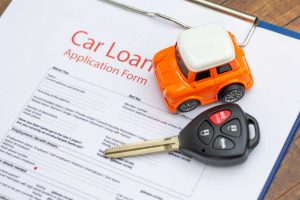Car loan terms can be confusing, leaving many drivers to wonder, how does car loan interest work—and are car loans compounded monthly? We’ve sifted through the formulas and equations to explain how car loan interest works and whether it fluctuates over time.
Most car loans are not compounded monthly. The most common type of car loan uses simple interest, which means the interest rate is based on the amount of money you owe from the outset. In short, the number does not change over the life of the loan, and it does not compound monthly.

Of course, it’s not quite as simple as saying that no, car loans don’t use compound interest. Regardless of your loan terms, you’re paying more than a set APR—and whether you’re getting a good deal depends on the loan amount, term length, and other factors.
How Do Car Loans Work?
When you get a car loan, the financial institution that grants your application is lending you their money. On your behalf, they pay off the vehicle entirely—and you pay them back with interest over a set period.
The amount of interest you pay is based on an APR, which is the percent of the amount that you borrow. It’s a flat rate that doesn’t fluctuate, which means it’s not compound interest. The APR applies to the loan amount, which is the vehicle price minus any negotiated deals and your down payment, as applicable.
In contrast with car loan interest, compound interest means that more fees pile on top of existing interest over time. The extra interest increases your costs and changes your monthly rate. Fluctuating payments are one reason why consumers tend to shy away from compound interest models.
Of course, compound interest can be bad news when you’re dealing with a loan. But it’s good news if you have a savings account that earns compound interest. For vehicle loans, though, APRs make the most sense.
Getting a low APR is vital for ensuring that your car payment is manageable and a good deal. But you must consider your loan amount and term length, too.
Why Does Term Length Matter?
A shorter-term can mean higher monthly payments, but you’ll also pay less interest over the life of the loan. Most experts recommend the shortest loan length you can afford, though options are available ranging from three to almost ten years.
Lower monthly payments might be appealing, but if you must pay longer, you will likely pay more in interest. Still, with a low enough APR, it might be worth choosing a longer term to make your monthly budget more manageable.
How Can You Get a Good APR?
Although most vehicle dealerships and used car lots offer their own financing options, those may not be the best deal. In fact, the APR you get through the car salesperson might be a terrible deal—and they won’t necessarily tell you that.
If you’re in the market for a new vehicle, do your research ahead of time. Find out what average rates are in your area, as well as what’s typical for the loan length you prefer. Checking with your financial institution often gives an accurate idea of what rates you can qualify for.
Even if your bank doesn’t offer vehicle loans, you can still shop around before agreeing to the terms that the dealership provides. You might find a lower APR that makes your monthly payments even more manageable.
How is Auto Loan Interest Calculated?
Auto loans use an APR—annual percentage rate—to determine how much you’ll pay for borrowing the loan amount, also known as the principal. The higher the APR, the more interest you pay over time. But the APR is not just an interest rate.
The actual interest rate—or note rate—on your car loan will be a lower number. It refers to the amount of interest you’ll pay per year on the loan amount itself. The APR is higher because it factors in other expenses related to your loan repayment.
Also involved in the formula are government fees, taxes, and any amounts your dealership or car sales lot charges for their services. You can use loan calculators to estimate monthly payments—including interest amounts—but include a margin of error around ten percent just in case.
How Does Car Loan Amortization Work?
While car loans don’t use compound interest, the amortization schedule can be complicated to navigate. Although your monthly payment stays the same throughout the life of the loan, you’re not paying equal amounts on the principal and interest each time.
Basically, amortization means spreading the amount you owe out over a set amount of time. At the beginning of the loan period, you’re paying mostly interest. Over time, that shifts, and you’ll be paying more on the principal.
When you estimate a car loan using an online calculator, it might show an amortization table or schedule. The breakdown shows you what ratios you’ll pay on the interest and principal for each month and year of the loan term.
How Car Payments Are Calculated
Car loan payments factor in the base interest rate, the APR, loan length, and principal amount. Each lender must provide you with the APR on the loan before requiring you to sign a contract. Therefore, you can compare APRs across different loan offers. Keep in mind that you can’t compare interest rates to APRs, however, because they are separate figures.
Most of the time, you only need to worry about the APR, since it includes the interest rate and any other applicable fees from the loan originator.
You should also note the loan term as it relates to APR rates. A low APR is desirable, but a balance between a favorable APR and a short loan term is ideal. After all, extending a loan term to seven years means paying more in interest than with a three-year loan.
Can You Avoid Interest by Paying a Loan Off Early?
Most car loans include an early payoff clause, and terms can vary. But in most cases, you can buy out your loan early without any financial repercussions. Many lenders provide a payoff calculating tool on their payment portals, which can tell you exactly how much you would owe if you decided to pay the entire balance today.
Some lenders have a prepayment penalty, though, so you should read your contract thoroughly before making a lump sum payment. And if your vehicle is a lease, you’ll still need to deal with financing to own the car or returning it once the term ends.
Is Paying a Loan Off Early a Good Deal?
Keep in mind that paying a vehicle loan off early can negatively impact your credit. Closing an account, in general, can have consequences for your credit score, and auto loans are no different. Credit scores are calculated using a combination of figures on your debt, repayment ability, payment history, and account age.
Therefore, paying off a car note ahead of time could eliminate the “oldest” account from your credit, potentially knocking your score down. So, while you can save in interest, there may also be benefits to keeping a vehicle loan open—at least until you build your credit up high enough to withstand the adverse effects of closing an account.
Of course, the goal is to have a manageable monthly budget in place to address your car payment and other debt. By selecting the lowest APR plus the shortest term available for your vehicle loan, you can establish an affordable plan for securing the make and model vehicle you want.



